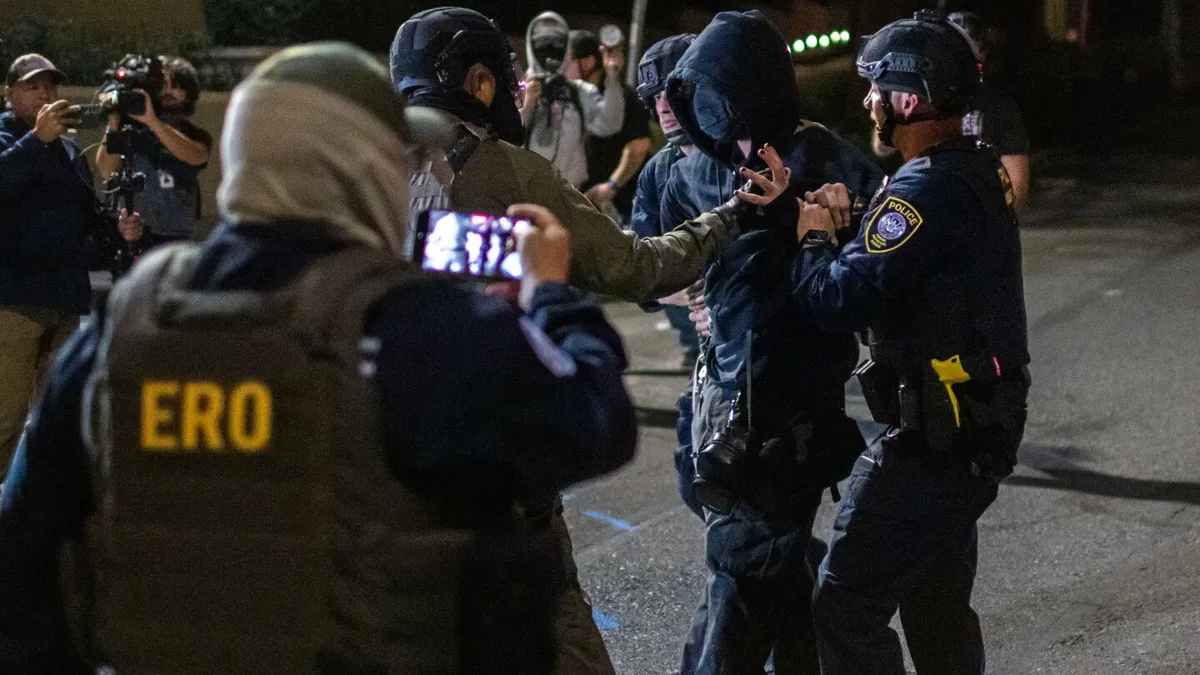
President Donald Trump’s recent deployment of National Guard troops in Illinois is facing critical legal challenges as a pivotal court hearing is set to take place. This hearing is scheduled for Thursday, just a day after a small number of National Guard troops began their operations, primarily aimed at protecting federal properties in the Chicago area.
U.S. District Judge April Perry will preside over the hearing, which will address a request to block the deployment of members from the Illinois and Texas National Guard. This move has garnered significant opposition from Illinois Governor JB Pritzker as well as local officials, who are strongly against the use of the Guard in this context. According to a spokesperson for the U.S. Northern Command, an “element” of the 200 Texas Guard troops dispatched to Illinois began their duties in the Chicago area on Wednesday, though specific locations have not been disclosed.
In total, approximately 500 troops, including 300 from Illinois, have arrived at a U.S. Army Reserve Center located in Elwood, southwest of Chicago. All these troops are operating under the Northern Command and have been activated for a duration of 60 days. Their primary mission is to provide protection for U.S. Immigration and Customs Enforcement (ICE) buildings, along with other federal facilities and law enforcement personnel, as stated by Northern Command.
This deployment is not an isolated incident; Trump has previously sent troops to other cities, including Los Angeles and Washington. Recently, a small contingent of troops began assisting law enforcement in Memphis as part of the Memphis Safe Task Force, which encompasses about a dozen federal law enforcement agencies mandated by Trump to combat crime in the area. Tennessee Governor Bill Lee, a Republican, has expressed support for utilizing the National Guard in this manner.
However, the deployment of military forces for domestic law enforcement raises concerns under the nearly 150-year-old Posse Comitatus Act, which places limits on the military's role in enforcing domestic laws. In light of this, Trump has suggested he might invoke the Insurrection Act, a law that permits a president to deploy active-duty military forces in states unable to quell insurrections or in cases of federal law defiance.
In response to the troop deployment, Chicago and Illinois have filed a lawsuit asserting that such actions are unnecessary and illegal. Trump has painted Chicago as a lawless “hellhole” plagued by crime, despite statistics indicating a significant decline in criminal activity in the city. During a recent statement, Trump suggested that Chicago Mayor Brandon Johnson and Pritzker, both Democrats, should face jail time for their alleged failures to protect federal agents amid immigration enforcement efforts.
In a court filing associated with the lawsuit, the city and state contend that protests at a temporary ICE detention facility in the Chicago suburb of Broadview have not significantly impeded federal immigration enforcement. They argue, “The President is using the Broadview protests as a pretext,” emphasizing that the troop deployment represents a broader strategy by the administration to target jurisdictions that the President disapproves of.
On the same day, a panel of judges from the 9th U.S. Circuit Court of Appeals was also scheduled to deliberate on the legality of Trump’s authority to assume control of 200 Oregon National Guard troops. These troops were intended for deployment in Portland, where there have been primarily small, nightly protests outside an ICE facility. State and city leaders have asserted that such military presence is neither desired nor necessary.
U.S. District Judge Karin J. Immergut previously issued a temporary restraining order blocking the deployment of Guard troops to Portland, which Trump had initially mobilized for the city just hours after being restricted from using Oregon’s Guard. The administration has yet to appeal this order to the 9th Circuit. Judge Immergut, appointed by Trump during his first term, dismissed the president’s claims that troops were essential for protecting Portland and immigration facilities, noting that there had not been sustained violent or disruptive protests in the city for several months.
As legal battles unfold, the implications of these military deployments continue to raise questions regarding the balance of state and federal powers in addressing domestic issues.